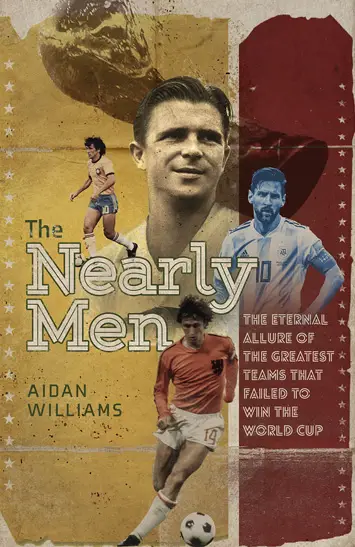The Nearly Men by Aidan Williams – Review

By Karl Hornsey
Whether it’s an exclusively British trait or not, there’s always been an element in the sporting world of wanting the underdog to win, or to idolise the ‘losers’ more than those who have been remarkably successful in their field. This is the case in individual sports, where the likes of Jimmy White was always far more popular than perennial world snooker champion Stephen Hendry, or Eddie ‘the Eagle’ Edwards was adored as a plucky Brit taking on a near impossible challenge, as well in team sports, especially in cup competitions.
And what bigger and more memorable cup competition could there possibly be than the football World Cup, sadly soon to get even bigger, potentially at the expense of creating storylines of those who should have tasted glory but ultimately fell short. Aidan Williams has taken 12 teams – from the inaugural tournament in 1930 right up to 2012 – and mapped out the timelines of those that burned so brightly yet couldn’t seal their dominance by lifting the trophy, even if that has since meant that they’ve been remembered far more than the victors. As Williams himself says, with the notable exceptions of Brazil in 1970 and arguably the Maradona-inspired Argentines in 1986, how often has the best team won the World Cup? Yes, there are a whole calendar full of pub debates to had over who deserved to taste the glory, but there remains a soft spot in our hearts for those who didn’t win. And surely that must still provide some comfort to those that don’t have a winner’s medal in their trophy cabinet at home.
“The human side of the sport”
 When I first heard of Williams’ book, three sides immediately sprung to mind, and I had to wrack my brain for more than that. But Williams has delved a little deeper, and made a convincing case for many more sides to be counted as The Nearly Men. For me, the ultimate has, and always will be, the Brazil team of 1982 that I’ve adored ever since, of Zico, Socrates, Falcao and many, many more, who couldn’t be loved more today had they actually won the thing and not merely featured in those five remarkable matches in Spain. With that being the first World Cup I watched, maybe I’m biased. But that’s partly the point. We all have our memories and our favourites, depending on when they came into our lives. As well as the Brazilians, I thought of the Netherlands side that managed the feat of not winning the World Cup when they should have done not just once, but twice during the 1970s, and of the Magnificent Magyars who swept all before them in the early 1950s before falling to West Germany and the swamp of a pitch in the 1954 final.
When I first heard of Williams’ book, three sides immediately sprung to mind, and I had to wrack my brain for more than that. But Williams has delved a little deeper, and made a convincing case for many more sides to be counted as The Nearly Men. For me, the ultimate has, and always will be, the Brazil team of 1982 that I’ve adored ever since, of Zico, Socrates, Falcao and many, many more, who couldn’t be loved more today had they actually won the thing and not merely featured in those five remarkable matches in Spain. With that being the first World Cup I watched, maybe I’m biased. But that’s partly the point. We all have our memories and our favourites, depending on when they came into our lives. As well as the Brazilians, I thought of the Netherlands side that managed the feat of not winning the World Cup when they should have done not just once, but twice during the 1970s, and of the Magnificent Magyars who swept all before them in the early 1950s before falling to West Germany and the swamp of a pitch in the 1954 final.
Williams neatly argues that there are others who should be held in such regard, although it’s hard, if not impossible, to make a better case than those three. Football historians will point to the ultimately tragic Austrians of the 1930s and those interested more in the modern game will look to Messi’s Argentina, but all will agree that a cup competition by its very nature offers the chance for some distinctly average sides to prevail, even at the highest and most exalted level. England can count themselves even more unlucky that their heartbreaking semi-final defeats against West Germany in the 1990 World Cup and Euro 96 also meant they missed out on facing two far from imposing sides in the finals – Argentina and the Czech Republic respectively. Even so, those England teams are lauded as some of the finest ever to hail from these shores, even if closer examination puts this theory under some duress. This is a book for those who aren’t obsessed with winners and with trophies, but with the human side of the sport, of those players and countries who deserved more on the day, but who ultimately have won far more than a trophy or a medal – the love and affection of millions of people around the world, and it’s well worth a read.
‘The Nearly Men’ by Aidan Williams is published by Pitch Publishing, £16.99 hardback









